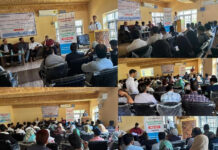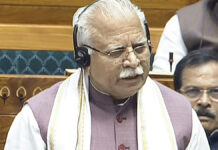DH NEWS SERVICE
New Delhi, Feb 16
Young advocates must volunteer to assist the litigants who cannot engage the services of a counsel due to lack of means or awareness, the Supreme Court has said.
Expressing appreciation for a young advocate who rendered legal aid to a party-in-person, a bench of Justices B V Nagarathna and Satish Chandra Sharma said lawyers should render best legal assistance to the litigant without any expectation in return for their professional services.
“Young advocates joining the bar must volunteer to assist the litigants who cannot engage the services of a counsel due to lack of means or awareness whenever an opportunity presents itself. Moreover, they should render the best legal assistance to the litigant without any expectation in return for their professional services.
“By these gestures of volunteering to represent indigent litigants, advocates can collectively make a statement to the society at large that the legal profession stands for the right to have access to justice and equality before law, not just in theory but in practice too,” the bench said.
The top court said such efforts of advocates, though in an individual capacity but acting towards a common objective of bringing an amicable quietus to the litigation, would send out a message that counsels are not hinderances in the process of parties reaching a mutually agreeable settlement, particularly in labour and matrimonial matters.
“They can also effectively play their parts in helping the parties end their disputes, and add positively to the alternate dispute mechanisms like mediation and conciliation.
“These are opportunities to make meaningful contributions to the society, and as a result the legal profession as a whole would gain the goodwill of the society in general and indigent litigants in particular,” the bench said.
Referring to the case, the bench said the counsel, advocate Sanchar Anand, appeared 14 times before this court to represent the petitioner in two years.
The petitioner, admittedly being a man of limited means, has not been able to pay a penny to the counsel for his services, it said.
“The counsel is not even an advocate on the panel of the Supreme Court Legal Services Committee, so as to receive some reasonable remuneration for his time and expenses. Yet, the counsel dedicatedly appeared before this court during these two years to not just represent the petitioner, but also to assist this court in reaching a just and proper conclusion to this case,” the bench said.
The apex court said access to justice before the highest court of the country is not bound by the shackles of lack of financial resources.
The bench said persons from all classes, etc., who wish to approach this court with their grievance, must be provided with necessary assistance by the responsible members of the bar, without increasing the cost of litigation for the party or unnecessarily delaying the process.
“This is a welcome change from the trend being witnessed in our court rooms, where the litigants located in far corners of this country have to shell out humungous sums of money in the name of professional fees for engagement of top echelons of the legal profession, particularly when the matters do not progress on a particular day.
“In lieu of their expectations for the constitutionally guaranteed right to justice at the hands of this court, they are often handed over a document that reads on top as ‘Record of Proceedings’ and which acts as a means of justifying the professional fees, without there being any substantial relief for the party concerned,” the bench said.
“The message that eventually spreads among the litigant public is that a hearing in this court is available only to those who have the wherewithal and can withstand the financial pressure arising from their litigation apart from the uncertainty of the result, and that the doors of justice may be inaccessible for others who can ill-afford to pay such high fees to lawyers.
“We must reiterate that this misconception is required to be broken. The duty to provide ease of access to justice rests upon every member of the legal profession and the requisite message needs to be disseminated from the portals and corridors of this court in the first instance in both letter and spirit,” the court said.


























